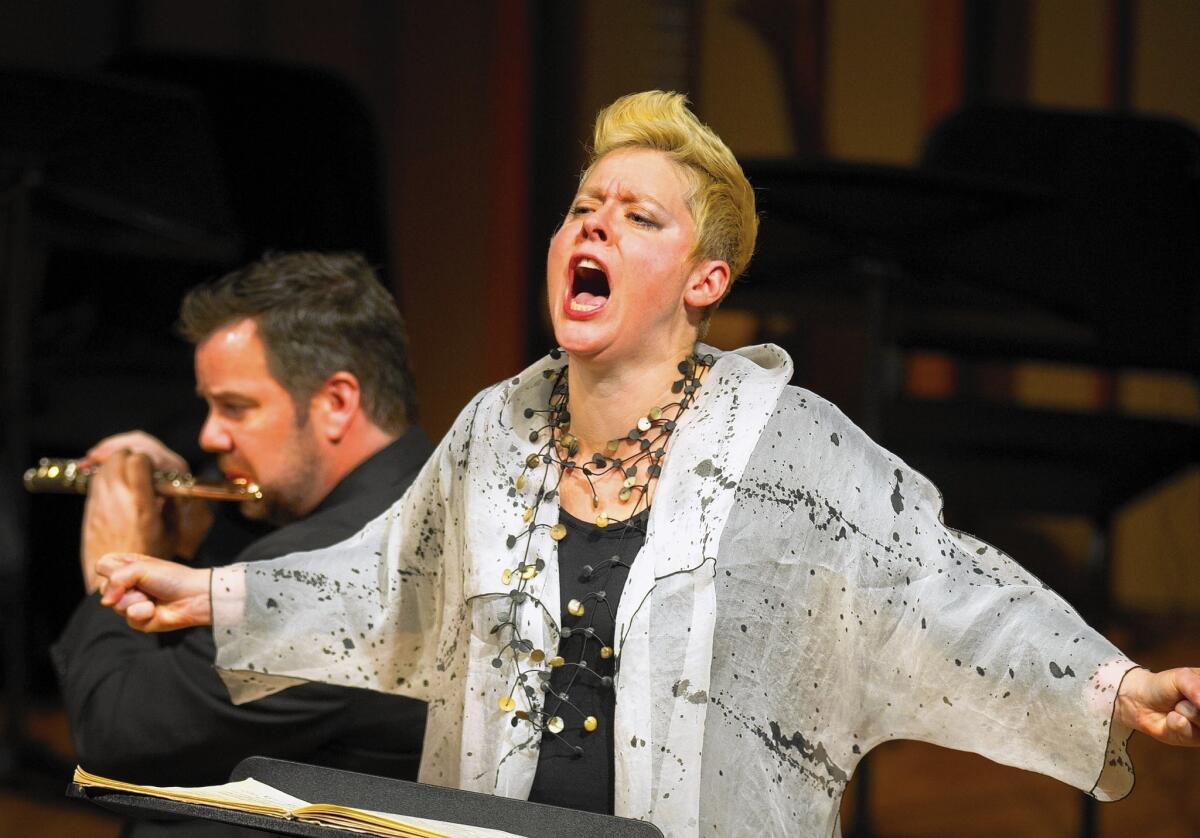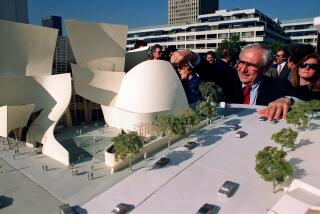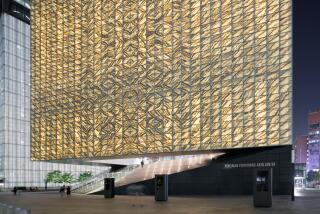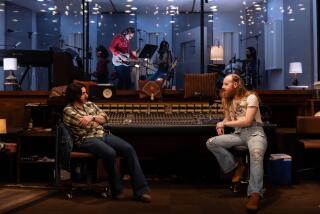Review: Monday Evening Concerts is back with a bang, whimper, whistle, click and clang in ‘Sideshow’

The audience at Zipper Hall on Monday night was but the first surprise. It included a number of fashionably dressed young people who looked as though they might well have passed up a night in a hot arts district club to attend a new music concert.
Then there was the concert itself. On stage, seven musicians sat in a straight line facing the audience; a pianist sat behind. A large, dried, open-mouthed fish head in an illuminated glass lab jar kept the players company.
The piece began in silence. The musicians slowly opened their mouths until they attained a creepily contorted grin. Then they went crazy.
SIGN UP for the free Essential Arts & Culture newsletter >>
Steven Kazuo Takasugi’s “Sideshow” is a 56-minute-and-50-second (the exact timing is important) exercise in musical spasmotics. That might not be a proper term, but no proper term suits the ensuing gestural weirdness, instrumental weirdness, vocal weirdness, electronic weirdness and poetic weirdness.
Based on nasty aphorisms of early 20th century Viennese satirist Karl Kraus and meant to evoke the darker corners of Coney Island a century ago, “Sideshow” is described by its composer as “a meditation on virtuosity, freak shows, entertainment spectacle, business and the sacrifices one makes to survive in the world.”
The New York-based Talea Ensemble delivered fabulously well on the virtuosity and entertainment spectacle. Takasugi — who is from Los Angeles, trained at UC San Diego and now on the Harvard faculty — came through big time with his promise of a freak show. I’m not so sure about business and sacrifice or meditation. But let’s not get greedy. This is an amazing piece.
Welcome to the new Monday Evening Concerts.
Begun in 1939 as Evenings on the Roof and said to be the oldest new-music series in the world, it got off to a late start this season because of an administrative change. Monday Evening Concerts now has a new, young artistic director, percussionist Jonathan Hepfer. Hepfer’s hipness clearly had something to do with the crowd of striking newcomers who joined longtime regulars in creating a something’s-happening-but-you-don’t-know-what-it-is atmosphere.
For all the strangeness of “Sideshow,” this was also a Monday evening very much in the MEC tradition. Talea is not a newcomer to the series, and the ensemble began the program with a golden oldie. Schoenberg’s “Pierrot Lunaire” was first performed at Evenings on the Roof in 1944, with the composer in attendance. Hepfer himself has been a regular performer at MEC during the last few years. And much of Hefper’s transitional first season as artistic director continues the innovations and aesthetic of his predecessor, Justin Urcis.
In fact, “Pierrot” was maybe a little too traditional. The revolutionary 1912 score for five instrumentalists and a vocalist sets texts by the Belgian Symbolist Albert Giraud that offer a surreal update on commedia dell’arte. Music came first in Toby Arnold’s recitation, which Schoenberg meant to be half spoken, half sung. James Baker conducted a well-considered performance.
But there wasn’t a lot of atmosphere. Back in 1944, Schoenberg had insisted that the texts be translated from German to English. Here they were in the original. Although Giroud’s poems were printed in the program, the auditorium lights were kept low and, I fear, left many listeners in the dark.
Following along to “Sideshow” was also a challenge, although, this time the atmosphere was so charged that few may have cared. In two parts, five movements and 41 sections (three of which are then divided into subsections), each precisely determined to the second, the piece comes with a table of contents. There is a lot to figure out. Movement II is titled: “Sodom by the Sea” or “Mildew of an Inner Room of the Eternal Return of the Same.”
Then there are the various references throughout to six Kraus aphorisms. One goes like this: “Technology is a servant who makes such noisy order in the next room that his master cannot make music.” But technology doesn’t stop Takasugi in the slightest. An electronic component to “Sideshow” was as noisy, and nosy, as could be, often musically and theatrically ordering the instrumentalists around.
Throughout the musicians did pretty much anything they could to their instruments. A percussionist violently attacked a guitar with what looked like a violin bow. Players stopped and insanely grinned on cue to illustrate the Movement I, “The Man Who Couldn’t Stop Laughing.”
Players blew silently on instruments, whether winds or otherwise, the breathing sounds coming from loudspeakers. They stomped their feet while “Electrocuting the Elephant.” They stopped and exaggeratedly stared — at us, at each other, at the fish.
But mainly they made meticulously crazy sounds (presumably keeping together with a click track). They were funny and, when they couldn’t stop laughing, disturbingly not so funny.
In the final section, the laughing stops along with the frenetic brutality. An Adagietto has something to do with guard dogs escorting Mahler to heaven. There is darkness, and then the darkness behind the darkness, in eerily slow, near-silent drones. Then just blank stares into space, no sound. The final section is: “As If Nothing Happened.”
As if! Plenty happened. Monday Evening Concerts is back — and happening.
More to Read
The biggest entertainment stories
Get our big stories about Hollywood, film, television, music, arts, culture and more right in your inbox as soon as they publish.
You may occasionally receive promotional content from the Los Angeles Times.






